|
Five-day boycott prevents vote on
additives in beef
By Shih Hsiu-chuan / Staff reporter

Democratic Progressive Party
Legislator Wu Ping-jui takes a nap in the legislature yesterday.
Photo: Lo Pei-der, Taipei Times
Legislative aides, officers and reporters
crowded onto the upstairs balconies in the legislature at about 5:30pm yesterday
to watch Chinese Nationalist Party (KMT) and -opposition-party lawmakers shout
slogans and exchange insults as the current legislative session came to a
deadlocked conclusion.
At 6pm, the statutory time for the end of the legislative session, legislators
led by the Democratic Progressive Party (DPP) and supported by the People First
Party (PFP) and Taiwan Solidarity Union (TSU) — holding 46 seats in the 113-seat
legislature — cheered their “victory” at preventing a vote on the relaxation of
rules governing imports of beef containing residues of the livestock
leanness--enhancing agent ractopamine.
This was a “moment of glory” for the opposition and a resounding “public
victory,” DPP caucus whip Ker Chien-ming (柯建銘) said.
“We occupied the speaker’s podium to demonstrate that people can exert their
right to resist and block legislative proceedings,” Ker said.
The first session of the Eighth Legislature, which ran from Feb. 1 to yesterday,
passed only 11 bills, the lowest for a legislative session in the country’s
history.
President Ma Ying-jeou (馬英九) was responsible for the poor record, Ker said,
adding: “This happened because Ma is so heavy- handed with the legislature and
poor government.”
It also “constituted a violation of the Constitution,” Ker said.
TSU caucus whip Hsu Chung-hsin (許忠信) acussed Ma, who doubles as KMT chairman, of
political manipulation of legislative proceedings.
“Ma’s plans to allow imports of US beef containing ractopamine residue would
deprive the nation of a bargaining chip in its dealings with the US. His
decision to raise electricity rates without reforming Taiwan Power Corp (台灣)
made people suffer. His plan to impose a capital gains tax on securities
transactions in defiance of opposition from his own party caused chaos in the
legislature,” Hsu said.
On issues concerning people’s livelihood, PFP caucus whip Thomas Lee (李桐豪) said
his caucus “stood on the side of ordinary people.”
The opposition launched a 120-hour boycott on Monday by occupying the speaker’s
podium and blocking the entrances to the chamber to prevent Legislative Speaker
Wang Jin-pyng (王金平) from entering the chamber.
The KMT holds 64 seats and a majority in the legislature.
While some KMT lawmakers took a hard line and repeatedly urged fellow lawmakers
to force a vote on the amendment to the Act Governing Food Sanitation (食品衛生管理法),
a substantial number of KMT lawmakers were clearly reluctant to use force to
secure a vote.
“We are not here to fight,” KMT Legislator Johnny Chiang (江啟臣) said.
Chiang said the opposition deserved condemnation for paralyzing the legislature,
but many KMT lawmakers doubted that the party would benefit from starting a
fight with the opposition over the beef issue.
KMT caucus whip Lin Hung-chih (林鴻池) said the public should condemn the
opposition for blocking the proceedings.
“In this session the DPP has blocked proceedings on 19 occasions, at committee
meetings, in the Procedure Committee and during the legislative sessions,” Lin
said.
Wang, a KMT member, was criticized by some members of his own party for not
clearly siding with the KMT in negotiations with the opposition.
Wang dismissed the criticism, saying he had called more than 10 rounds of
negotiations between the parties during the five-day boycott.
However, he did apologize to the public for failing to keep the legislature open
and condemned the opposition for occupying the legislative floor and blocking
all proceedings.
|
![]()
![]()
![]()